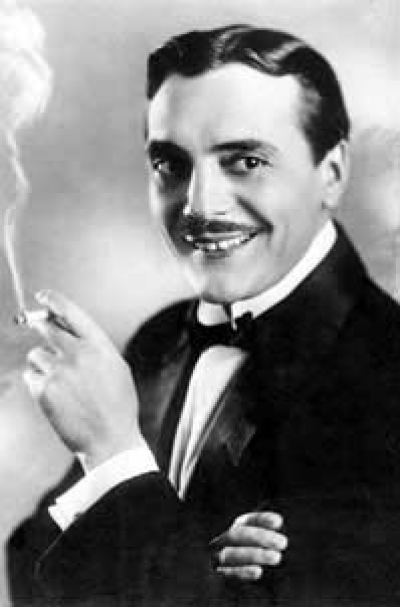
Biography
Max Linder (December 16, 1883 – October 31, 1925) was an influential French pioneer of silent film.
Contents
1 Birth and early career
2 Film
3 United States
4 Depression and suicide
5 Legacy
6 Selected coverage in the New York Times
7 External links
8 Selected filmography
Birth and early career
Born Gabriel-Maximilien Leuvielle in Saint-Loubès, Gironde, France to a Jewish wine growing family, he grew up with a passion for the theater and as a young man joined a theater troupe touring the country. While working in Paris on the theater stage and in music halls, Leuvielle became fascinated with motion pictures and in 1905 took a job with Pathé Frères that saw him become a comedic actor, director, screenwriter, as well as a producer under the stage name, Max Linder.
Film
Max Linder created what was probably the first identifiable motion-picture character who appeared in successive situation comedies. Linder made more than one hundred short films portraying "Max," a wealthy and dapper man-about-town frequently in hot water because of his penchant for beautiful women and the good life. By 1911, he was directing his own films as well as writing the script and the universality of silent films brought Linder fame and fortune throughout Europe, making him the highest paid entertainer of the day. World War I brought a temporary end to his career in film. Physically unfit for combat duty, he worked as a dispatch driver during the war until he was seriously wounded.
United States
In 1916, Linder received and accepted an offer from Essanay Studios of Chicago, Illinois to work in the United States. Unfortunately, his first few American made "Max" films didn't connect with the U.S. audiences and the studio cancelled production of the remaining films in his contract. Linder returned to France in 1917 but two years later made another attempt at filmmaking in Hollywood. Once more, his American productions were box office failures and a discouraged Max Linder went back to his homeland. After having made several hundred short films, he all but gave up on the business, appearing in only two more films during 1923 and 1924 including "Secours" (Help!) for director Abel Gance.
Depression and suicide
The aftereffects of Linder's war service was that he suffered from continuing health problems including bouts of severe depression. In 1923, he married an 18-year old girl with whom he had a daughter they named Maud Max Linder aka Josette. The emotional problems besetting Linder evidenced themselves in early 1924 when he and his wife attempted suicide at a hotel in Vienna, Austria. They were found and were recuperated, the incident covered up by the physician reporting it as an accidental overdose of sleeping powder. However, in Paris on October 31, 1925 Linder and his wife were successful in taking their own lives.
Legacy
After Max Linder's death, Charles Chaplin dedicated one of his films: "For the unique Max, the great master - his student Charles Chaplin". In the ensuing years, Linder was relegated to little more than a footnote in film history until 1963 when a Max Linder compilation film titled Laugh with Max Linder was released and in 1983 his daughter made a documentary film titled The Man in the Silk Hat. In his honor, Lycée Max Linder, a public school in the city of Libourne in the Gironde département near his birthplace was given his name.
Selected coverage in the New York Times
New York Times; November 01, 1925; page 1. "Max Linder and Wife in Double Suicide; They Drink Veronal, Inject Morphine and Open Veins in Their Arms. Paris; October 31, 1925. Max Linder, one of the earliest film comedians in the world, committed suicide this morning in a death compact with his lovely wife, formerly Miss Peters, a wealthy Paris heiress."
New York Times; November 02, 1925; page 1. "Max Linder's wife could not quit him; Refused to Heed Her Mother's Pleading, Though She Wrote "He Will Kill Me." Bothe left last letters. "Quo Vadis" Film Is Believed to Have Pointed One Way of Suicide to Star. Paris; November 01, 1925. Permission to bury the bodies of Max Linder, France's great cinema actor, and his wife, was given today by the Magistrate in charge of the inquiry into the causes of their death, and so it must become the official version that they died in a suicide compact."
New York Times; January 20, 1935; page 19. "Parents of suicide dispute over child; French Comedian and Wife Who Killed Themselves in Paris Left Conflicting Wills. Paris; January 19, 1935 (AP) Nine years after the double suicide of Max Linder, celebrated French movie comedian and his wife the court contest for custody of their daughter, Josette, has been renewed between two embittered families."

































